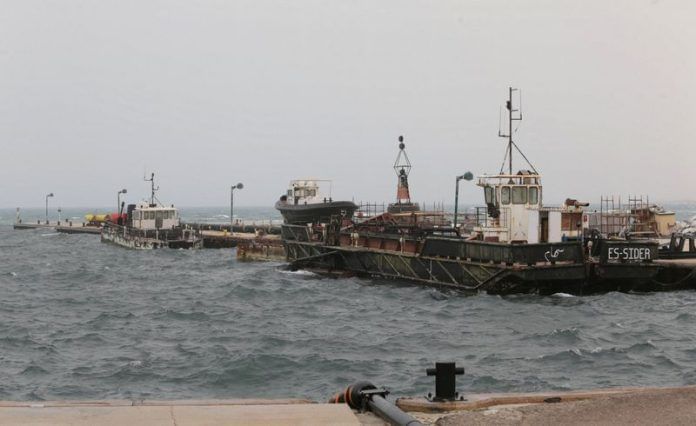By Nicole Jao
NEW YORK (Reuters) -Oil prices edged down on Tuesday, extending the previous day’s losses, as concerns over disruption to Libyan oil loadings eased.
Fears of weaker demand linked to soft economic data from China and rising temperatures elsewhere also pressured prices.
Brent crude oil futures were down 11 cents, or 0.14%, at $76.97 per barrel at 1:35 p.m. EST (1835 GMT). U.S. West Texas Intermediate crude futures were down 9 cents, or 0.12%, at $73.08.
Brent settled on Monday at its lowest since Jan. 9, while WTI hit its lowest since Jan. 2.
In Libya, local protesters prevented crude oil loadings on Tuesday at Es Sider and Ras Lanuf ports, putting about 450,000 barrels per day of exports at risk.
However, fears of supply disruption eased after Libya’s state-run National Oil Corp said export activity was running normally after it held talks with protesters.
“The market priced in the risk of Libyan oil supply disruption before it became clear that flows for now are not disrupted, with the risk premium evaporating again,” UBS commodities analyst Giovanni Staunovo said.
“There remains a risk of new disruptions down the road,” he added.
Elsewhere China, the world’s largest crude oil importer, reported on Monday an unexpected contraction in January manufacturing activity.
“The general tone of caution in the risk environment, coupled with weaker Chinese PMI numbers that cast further doubt on China’s oil demand outlook, may serve as a drag on oil prices,” IG analyst Yeap Jun Rong said.
China’s crude oil demand is also expected to be hit by the latest U.S. sanctions on Russian oil trade.
FGE analysts see refineries in Shandong losing up to 1 million barrels per day of crude supply in the near term amid a ban imposed by the Shandong Port Group on U.S.-sanctioned tankers.
Several independent refineries in China have halted operations, or plan to do so, for indefinite maintenance periods, sources told Reuters, as new Chinese tariff and tax policies plunge plants deeper into losses.
In the U.S., weather forecasts are for warmer-than-normal temperatures through this week, which are also weighing on demand for heating fuels after extreme cold sparked a natural gas and diesel rally in prior sessions.
The dollar index strengthened on Tuesday amid fresh tariff threats from the Trump administration. U.S. President Donald Trump said on Monday he planned to impose tariffs on imported computer chips, pharmaceuticals and steel.
A stronger dollar also pressured prices by making oil more expensive for holders of other currencies.
Oil markets remain jittery, and it will be some time before there is clarity on the ramifications of U.S. policy involving tariffs and sanctions, said Ashley Kelty, an analyst at Panmure Liberum.
(Reporting by Nicole Jao and Shariq Khan in New York, Gabrielle Ng in Singapore and Arunima Kumar in Bengaluru; Additional reporting by Paul Carsten; Editing by Jason Neely, Mark Potter, Jan Harvey and Nia Williams)
Disclaimer: This report is auto generated from the Reuters news service. ThePrint holds no responsibility for its content.






